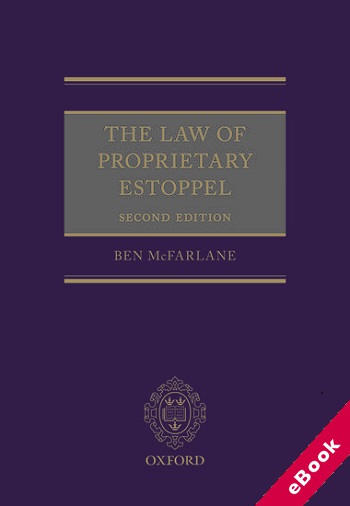We are now closed for the Christmas and New Year period, returning on Monday 5th January 2026. Orders placed during this time will be processed upon our return on 5th January.

The device(s) you use to access the eBook content must be authorized with an Adobe ID before you download the product otherwise it will fail to register correctly.
For further information see https://www.wildy.com/ebook-formats
Once the order is confirmed an automated e-mail will be sent to you to allow you to download the eBook.
All eBooks are supplied firm sale and cannot be returned. If you believe there is a fault with your eBook then contact us on ebooks@wildy.com and we will help in resolving the issue. This does not affect your statutory rights.
This is the second edition of the leading authority on the law of proprietary estoppel, which has been cited by courts across the common law world. It is a comprehensive and practically structured resource which offers guidance on managing proprietary estoppel cases. Relevant authorities are set out in a clear and accessible way, helping readers to make sense of a complex and rapidly developing area of law. Recent case-law discussed in the second edition, from England but also with updated reference to other common law jurisdictions, including new decisions of the top courts in each of Australia, Canada, and Singapore.
Proprietary estoppel has come to particular prominence in recent years: it is frequently pleaded by litigants wishing to show that they have informally acquired an interest in land. As a result of its vigorous development by the courts, there is no comprehensive and uncontroversial definition of the doctrine. There is also much debate as to the relationship between proprietary estoppel and other doctrines, such as constructive trusts and unjust enrichment. A problem faced by anyone seeking to make, or respond to, a proprietary estoppel claim is that the law is to be found almost entirely in cases.
This new edition of The Law of Proprietary Estoppel sets out a clear structure with which to understand the law and thus assists practitioners, academics, and others in navigating their way through the complex case-law on proprietary estoppel, and also in understanding its relationship with related doctrines, particularly other forms of estoppel. It has been fully updated with analysis of key recent cases in the farming and family context (eg Davies v Davies [2016] EWCA Civ 463, Moore v Moore [2018] EWCA Civ 2669, Habberfield v Habberfield [2019] EWCA Civ 890 and Guest v Guest [2020] EWCA Civ 387) and in the commercial context (eg Hoyl Group Ltd v Cromer Town Council [2015] EWCA Civ 782 and Farrar v Miller [2018] EWCA Civ 172), considering issues such as the requirements of a proprietary estoppel claim, the role of formalities, and the satisfaction of an estoppel equity.